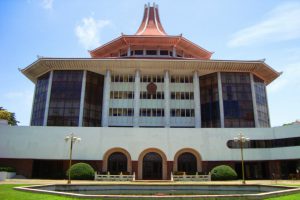Supreme Court of the Democratic Socialist Republic of Sri Lanka: A Full Judge Bench of B.P. Aluwihare, Murdu N.B. Fernando, and S. Thurairaja, JJ., allowed a Fundamental Rights application under Article 11.
Petitioner submitted that he was arrested on the 25th of September and that he was not informed of the reasons for his arrest. He further stated that he was tied up and hung on the rear door of the jeep and assaulted as a result of which he broke his left arm. The assault resulted in a fracture of his left hand and losing consciousness. When the Petitioner subsequently regained consciousness he noticed that he was at an Ayurvedic centre in Wijayapura. Thereafter he was taken to the Anuradhapura Police Station and was kept in a room adjacent to the Crime Branch. The Petitioner states that while detained in the police station, he was subjected to torture by police officers attached to the Anuradhapura Police Station. The Respondents maintain that as the jeep approached the main road from the junction while taking the suspects by jeep to the police station due to a steep incline the wheels skidded and this resulted in the rear doors of the jeep springing open. The Respondents assert that the Petitioner in his attempt to escape at that moment jumped out and tripped, landing heavily on his left shoulder thereby injuring himself and deny the use of any force.
The Court observed that there was no material submitted before the Court that the 2nd and 3rd Respondents have reported this matter to the higher authorities of the Police Department, namely the ASP and higher. The Court mentioned in detail the Departmental Order Bearing No. A 20 which contained responsibilities of Police and the rights of the persons under arrest, Departmental Order Bearing No. E 6 which set out the procedure to be followed by the police when a prisoner escapes from the custody of the police and same procedure was applicable where a suspect attempted to escape from the custody of the police, the IG circular No. 2328/2011 which set out the manner in which the suspects who were under the custody of the police should be protected. On the examination the Court found that it was evident that the Respondents involved in this matter had not complied with the necessary procedure, it was also unheard of that when a person is injured when trying to escape from the police custody for him to be taken to an ayurvedic medical physician to be treated and further stated that according to Code of Criminal Procedure Act No. 15 of 1979 the police officer was compelled to produce him before a Government Medical Officer and must obtain a report (MLR) and submit the same to the Magistrate and the recoveries made by the police officer must be checked and itemized.
The Court stated that,
“Respondents as police officers are expected by virtue of the colour of their uniform to be more accountable in their duty than an ordinary citizen of the country. A police officer is a repository of State duties, who has been prescribed with law enforcement duties. When a fundamental rights application of this nature is filed, Court expects reasonable explanation with documents and evidence and not just a mere denial. A denial in itself will not suffice.”
The Court further relied on the cases of Ansalin Fernando v. Sarath Perera, (1992) Vol. 2 SLR 411, Amal Sudath Silva v. Kodituwakku Inspector of Police, (1987) Vol. 2 SLR 119, Velmurugu v. Attorney General, (1981) Vol. 1 SLR 406, Bandula Samarasekara v. Vijith Alwis, (2009) Vol. 1 SLR 213, Senthilnayagam v. Seneviratne, (1981) Vol. 2 SLR 187. The Court also relied on the Indian Supreme Court judgment in State of Uttar Pradesh v. Ram Sagar Yadav, (1985) 1 SCC 552 where it was held,
“It is necessary that the Government amends the law appropriately so that policemen who commit atrocities on persons who are in their custody are not allowed to escape by reason of paucity or absence of evidence. Police Officers alone and none else can give evidence as regards the circumstances in which a person in their custody comes to receive injuries while in their custody. Bound by ties of a kind of brotherhood, they often prefer to remain silent in such situations and when they choose to speak they put their own glass upon facts and pervert the truth. The result is that persons, on whom atrocities are perpetrated by the police in the sanctum sanctorum of the Police Station, are left without evidence to prove who the offenders are. The law as to the burden of proof in such cases may be re-examined by the legislature so that hand-maids of law and order do not use their authority and opportunities for oppressing the Innocent citizens, who look to them for protection.”
The Court allowed the application considering the available material found the complaint made by the Applicant to be factual, that he was subject to torture at the hands of the 2nd and 3rd Respondent. Therefore, Court found that the right of the Applicant enshrined under Article 11 of the Constitution was violated.[Nandasenage Lalantha Anurdha v. Head Quarter Inspector of Police, 2020 SCC OnLine SL SC 9, decided on 22-10-2020]
Suchita Shukla, Editorial Assistant has put this story together

